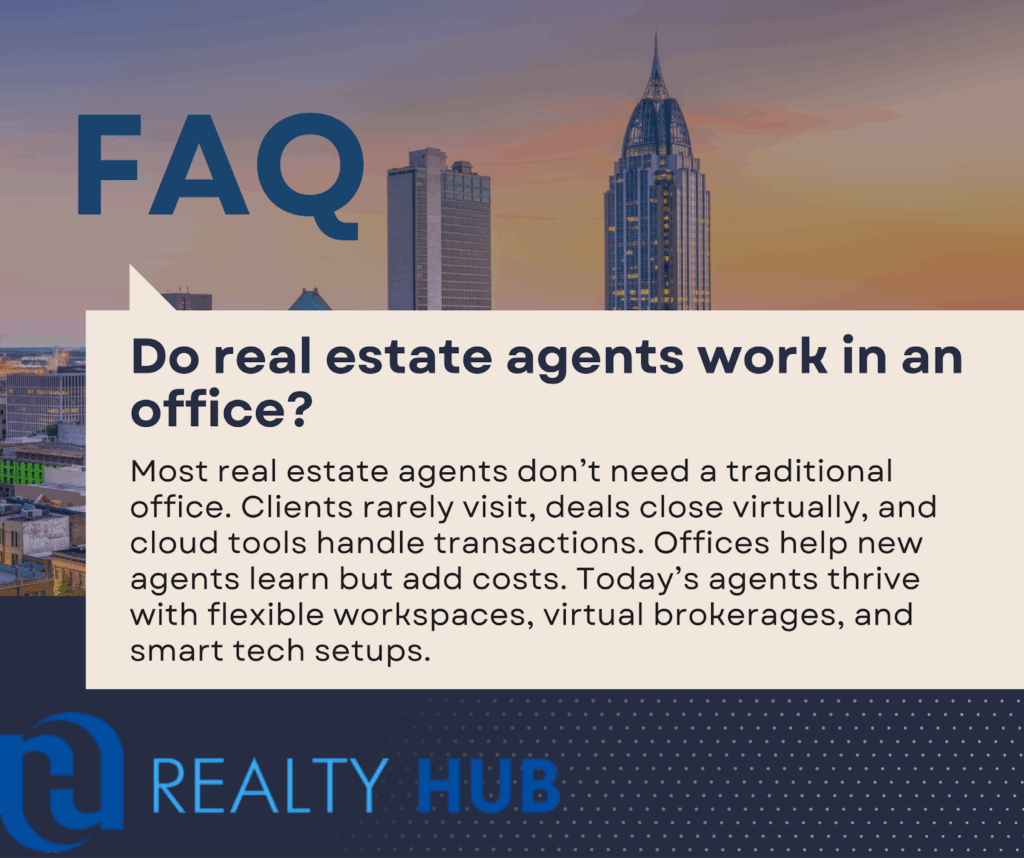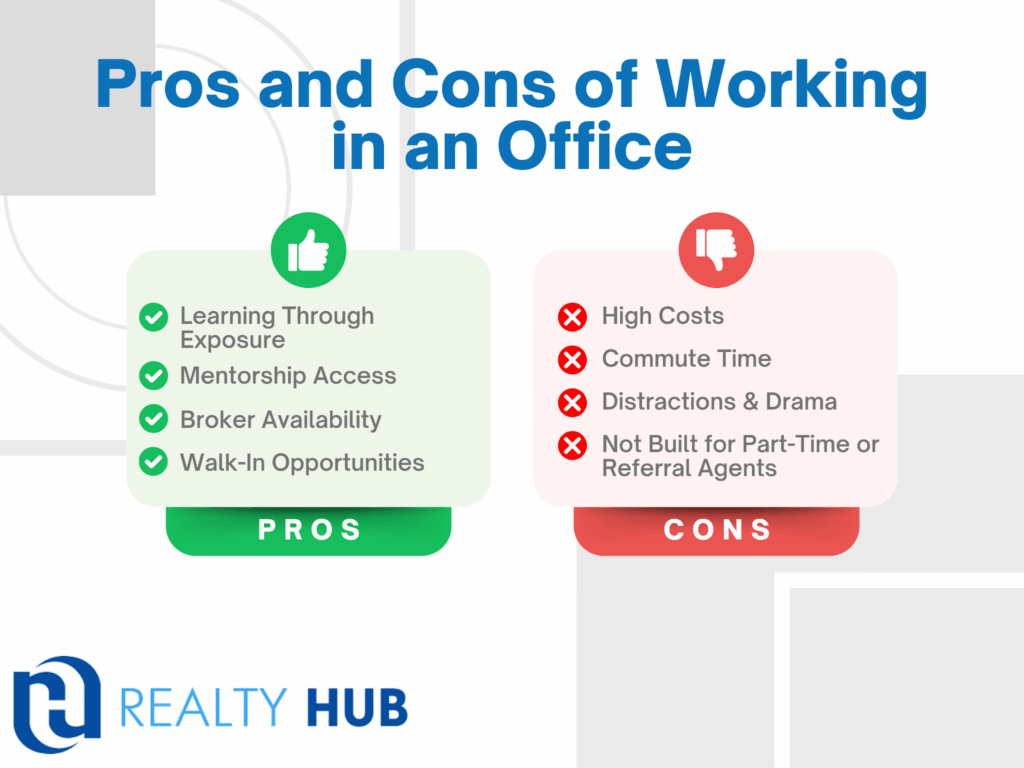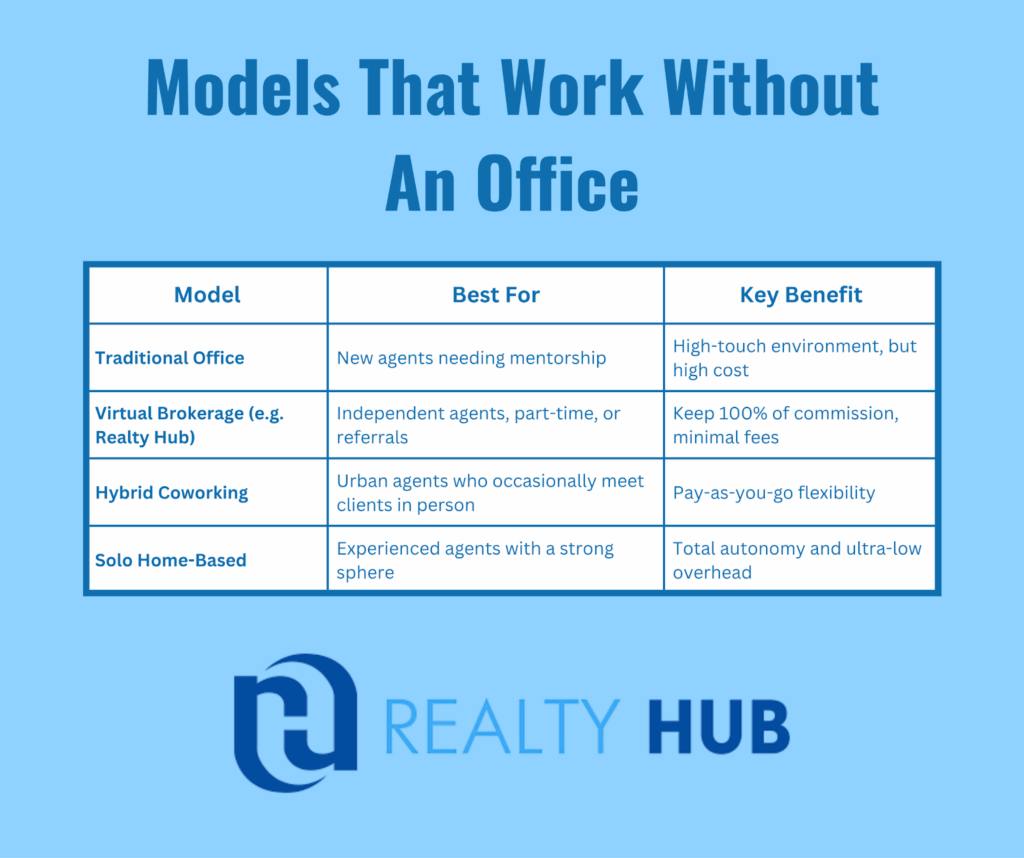Most real estate agents don’t need a traditional office. Clients rarely visit, deals close virtually, and cloud tools handle transactions. Offices help new agents learn but add costs. Today’s agents thrive with flexible workspaces, virtual brokerages, and smart tech setups.

If you’re an agent trying to decide whether you need an office, the real question is: does paying for physical office space improve your income or productivity?
For most agents, especially those who are independent, part-time, referral-focused, or experienced, the answer is no. What you actually need is responsive broker support, efficient compliance systems, and tools that allow you to serve clients wherever you are.
That’s exactly why we built Realty Hub. Our flat-fee brokerage model gives licensed agents in Florida, Georgia, and Alabama the freedom to run their business entirely on their terms, with full broker support when you need it and independence when you don’t.
You keep 100% of your commission while we handle compliance, transactions, and broker oversight remotely. No desk fees. No franchise fees. No office overhead eating into your earnings.
If you simply want a straight answer and the fastest way to eliminate unnecessary brokerage costs, you’re all set. But if you’d like a deeper breakdown of how office models are evolving, how agents are thriving without one, and whether going virtual is right for your career stage, keep reading.
What Is Considered an “Office” in Real Estate Today?
The word “office” has evolved dramatically in real estate. It’s no longer limited to four walls, cubicles, and a receptionist at the front desk. Today, your office is wherever you run your business, because that’s what clients expect.
Here’s how modern real estate offices break down:
- Traditional Broker Offices: These are the physical spaces most people picture, desks, copy machines, private meeting rooms, and reception staff. They still exist, but for many agents, they’re more about the brokerage’s brand image than daily utility.
- Virtual Brokerages: Platforms like Realty Hub offer full brokerage services, compliance, broker access, transaction management, entirely online. There’s no brick-and-mortar overhead, and agents can work from anywhere.
- Hybrid Models: Some agents use coworking spaces or rent conference rooms when they need to meet clients face-to-face. This pay-as-you-go approach gives the flexibility of remote work with the option for in-person meetings when necessary.
- Home Offices: With mobile tech, cloud storage, and CRM systems, many agents close deals from a laptop on their kitchen counter. Home offices are becoming the operational base for top producers, especially those focused on digital lead generation and virtual showings.
In today’s market, “having an office” is less about where you sit and more about how you serve. If your systems work and your clients are happy, your address is irrelevant.
Do Agents Have to Work in a Physical Office?
Legally? No, at least not in most states. Real estate agents are not required to work from a physical office unless specific state regulations or broker policies demand it. In Florida, Georgia, and Alabama, where Realty Hub operates, agents are fully empowered to work remotely under a compliant virtual brokerage.
The reality is this: clients aren’t walking into offices anymore. They’re texting listings, FaceTiming walkthroughs, and signing contracts on their phones. Most meetings happen at properties, via Zoom, or in neutral spaces like coffee shops. The need for an office, from the client’s perspective, has all but disappeared.
That’s why Realty Hub is 100% virtual. We give agents the freedom to build a lean, mobile business, without the drag of physical office requirements. Still, some brokers keep a small physical presence for license or audit compliance. But that doesn’t mean you have to be there.
The Pros of Working in an Office

For certain agents, especially those just starting out, offices still offer benefits. Here’s what you get in a traditional setup:
- Learning Through Exposure: Being surrounded by other agents means overhearing real deals, negotiations, and problem-solving conversations. That kind of unstructured learning is hard to replicate online.
- Mentorship Access: Office proximity can help newer agents get face time with brokers and senior colleagues who are open to answering questions on the spot.
- Broker Availability: Some agents feel more confident having their broker down the hall for quick contract reviews or compliance checks.
- Team Structure & Accountability: Daily check-ins, office culture, and competition boards can help agents stay motivated and on-task.
- Walk-In Opportunities: Though rare, some locations still generate leads through floor time or drop-in traffic, especially in high-density or tourist areas.
If structure, social energy, or in-person collaboration is how you thrive, an office might still serve you well.
The Downsides of Office Dependency
But let’s talk tradeoffs, because traditional offices aren’t free.
- High Costs: Most agents in office-based brokerages pay through commission splits, desk fees, or franchise fees. These overhead costs eat into your earnings, even if you never sit at your desk.
- Commute Time: Time spent driving to and from an office is time not spent prospecting, showing homes, or following up on leads.
- Distractions & Drama: Offices can foster collaboration, or they can become a minefield of gossip, politics, and unproductive chatter.
- Not Built for Part-Time or Referral Agents: If you’re doing real estate on the side or focusing on referrals, paying for office space makes no financial sense.
At Realty Hub, we built our model for agents who want efficiency, flexibility, and profitability. You won’t pay for office space you don’t use. You won’t be charged to “hang your license.” You’ll just keep more of your commission and get back to what matters, serving clients.
Why More Agents Are Thriving Without Offices
The shift away from physical office space is a transformation. More agents than ever are thriving by working lean, remotely, and strategically.
- Technology Handles Everything: Digital transaction platforms manage contracts, e-signatures, and compliance in one place. You can close deals from anywhere with a laptop and hotspot.
- Clients Don’t Care Where You Sit: Buyers want fast responses and clear communication. Sellers want marketing that moves homes. Nobody’s asking if you lease office space, they’re asking how quickly you can deliver results.
- Full Broker Support Is Still Available: At Realty Hub, our brokers are just a phone call or Zoom away. Whether you’re reviewing a tricky deal or checking compliance, you get timely, personal support, no desk visits required.
- Learning Has Gone Virtual: We’ve replaced watercooler talk with active online groups where agents share real-time advice, wins, and strategies. You’re never isolated, you’re just not wasting time in traffic to get help.
- You Keep More of What You Earn: With a flat-fee model ($100 per year + $100 per transaction), Realty Hub agents keep 100% of their commission. That means more income, less overhead, and total control of your business model.
What Should New Agents Do Without an Office?
If you’re just starting out and don’t have an office to show up to, the key is creating structure and momentum from day one. Here’s a foundational daily flow many successful agents use:
- Morning:
- Cold call FSBOs and expired listings
- Check MLS hot sheets and client follow-ups
- Role-play scripts or objection handling with a peer
- Midday:
- Attend a virtual coaching session or training
- Create video content or market updates for social media
- Review active transactions and pending documents
- Afternoon:
- Drop off postcards in your farm area
- Volunteer or attend a local networking event
- Host or shadow an open house with another agent
- Daily Wrap-Up:
- Log activity in your CRM
- Review progress with your broker or mentor via phone or Zoom
- Set tomorrow’s priorities
No office? No problem. With this structure, you build skills, grow visibility, and stay productive, without ever swiping a building keycard.
Broker Models That Work Well Without an Office
Choosing the right broker model is everything. Here’s how different setups compare based on your goals and experience:

At Realty Hub, we’ve designed our model specifically for agents who don’t need an office to succeed, but still want support when it matters. No fluff, no desk fees, just tools that work and a broker who picks up the phone.
Pro Tips for Running Your Real Estate Business Remotely
Success without a traditional office is increasingly the norm. If you’re running your business from home or on the go, here’s how to stay sharp:
- Use a High-Quality CRM: Automate follow-ups, manage your pipeline, and track transactions from anywhere. A good CRM turns chaos into clarity.
- Boost Your Online Visibility: Clients Google you before they call you. Focus on reviews, local SEO, and a polished digital presence.
- Host Professional Virtual Meetings: A clean Zoom background, good lighting, and business attire on video go a long way toward building trust.
- Leverage Coworking Spaces as Needed: When it’s time for an in-person deal, have a plan. Flexible memberships let you book polished meeting spaces when needed.
- Grow Your Network Digitally and Locally: Engage with your audience on social media. Join community groups. Be present, even when remote.
With the right systems in place, you don’t need an office to operate like a pro.
Do You Really Need an Office?
If you’re wondering whether an office is still necessary in real estate, here’s the answer: not anymore.
Offices used to signal legitimacy and provide structure. Today, they often add cost without adding value. For agents who are self-motivated, client-focused, and tech-savvy, office dependency is optional. The real trade-off is between cost and support.
At Realty Hub, we’ve built a model that flips the traditional structure. You keep 100% of your commission. You don’t pay for office space you’ll never use. And you still get the support of an experienced broker who answers the phone, reviews your deals, and keeps your business compliant, all without stepping foot into a conference room.
The right setup depends on where you are in your career. If you need daily in-person guidance and prefer office energy, a traditional setup might suit you. But if you value freedom, autonomy, and profit, there’s a better way.
Ready to Build a Leaner, Smarter Business?
If this article made you question why you’re still paying for an office you don’t use, or reminded you how much more productive and profitable you could be without one, Realty Hub was built for you.
Here’s what we offer:
- Flat-Fee Freedom: $100 per year, $100 per transaction. That’s it. Keep 100% of your commission, no desk fees, no franchise cuts.
- Real Broker Access: Get quick, knowledgeable support from a seasoned broker, without ever driving to a meeting.
- Compliance Without Complexity: We handle document review, license oversight, and state compliance so you can stay focused on deals.
What does your business look like without office overhead? More income, more control, and the ability to serve your clients wherever they are.
If you’re ready to ditch costly office fees, stay compliant, joining Realty Hub is the smartest move.


